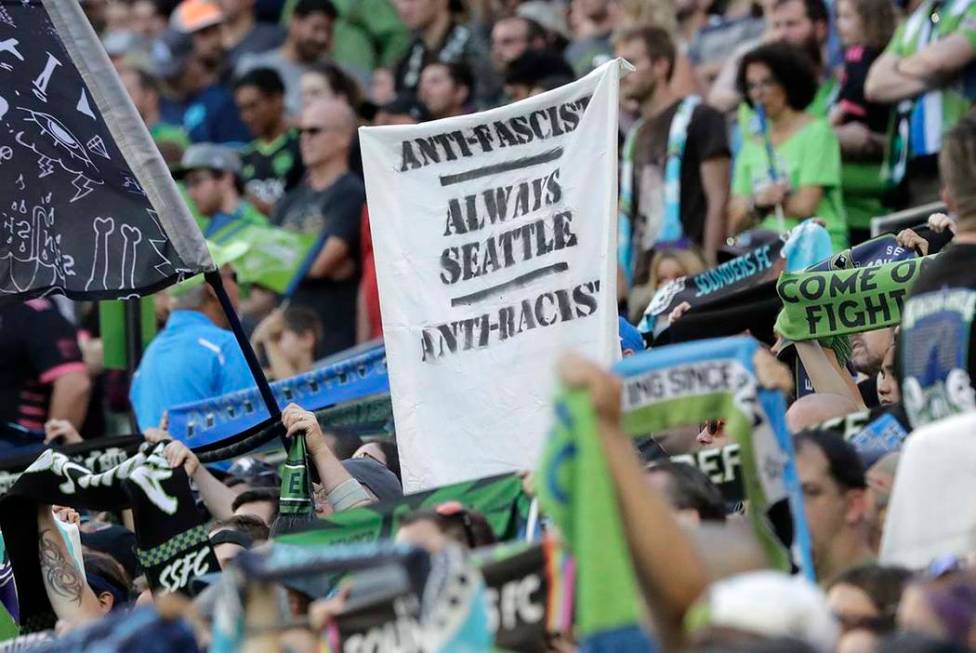MLS policy banning political display stirs controversy

PORTLAND, Ore. — Major League Soccer’s new policy that bans political displays at matches is stirring controversy in the Pacific Northwest, where supporters’ culture is often intertwined with politics and social issues.
The Seattle Sounders and the Portland Timbers have banned signs and flags with the “Iron Front” symbol, which they say has become appropriated by some in the loosely structured antifa movement, at times in the context of violence.
The symbol of three arrows pointing downward and to the left dates back to an anti-Nazi paramilitary organization formed in Germany in the 1930s. Supporters’ groups maintain the symbol represents opposition to fascism and persecution — a human rights issue, not a political stance.
“With the recent rise in targeted attacks against so many groups — LBTGQ+, immigrants, women, religious groups, and more — and the presence of fascists in our stadiums, this symbol represents our firm stance of combating hatred in soccer, our communities, and our world,” the board of directors for Portland’s 107 Independent Supporters Trust said in a statement. The group represents fans of both the Timbers and the NWSL’s Thorns.
The league’s new fan code of conduct, implemented this season, prohibits “using (including on any sign or other visible representation) political, threatening, abusive, insulting, offensive language and/or gestures, which includes racist, homophobic, xenophobic, sexist or otherwise inappropriate language or behavior.”
MLS president and deputy commissioner Mark Abbott said the league worked with all its teams to devise the policy.
“I think it was the belief of the league and the clubs that fans are at our games to enjoy the game and that there is a place for third-party political organizations or groups to express their views, but that place isn’t within our stadiums,” Abbott told The Associated Press.
Major League Soccer is the only professional league among the top five in the United States with a code of conduct that expressly bans political signage. Policies for the NFL, NHL, NBA and MLB mostly deal with fan conduct, like abusive behavior or language, and intoxication. The NBA prohibits “obscene or indecent messages” on signs.
MLS is also the only league to specifically target racist, homophobic, xenophobic and sexist language or behavior, which was lauded by supporters’ groups.
However, a number of individual teams across sports, as well arenas and stadiums, do regulate signage and prohibit messages that are political in nature. The Moda Center, home of the Portland Trail Blazers, does not allow signs that are commercial, political or obscene.
Some questioned the Major League Soccer’s inclusion of political displays as too vague.
“We, as an organization, feel strongly on ensuring that displays of human rights are not mistaken for political statements. Political engagement is sometimes necessary in securing human rights for all, but that does not make the message of human rights inherently political,” the Independent Supporters Council of North America said in a statement following the release of the policy.
Earlier this season, a fan waving a Trump 2020 flag was removed from Providence Park.
Sounders supporters took issue when the Iron Front symbol was included with mentions of far-right groups Patriot Prayer and the Proud Boys in a letter from team management that explained the ban.
“Messages, banners, flags or any other symbols that represent an association to a political group will not be allowed in CenturyLink Field. This includes, but is not limited to, Antifa, Iron Front, Proud Boys and Patriot Prayer,” the letter from team management said.
The Sounders later apologized for equating the groups. Taylor Graham, Sounders vice president of business operations and marketing, spoke to reporters following practice last week, saying: “We first and foremost want to put our hand up and say, ‘That’s not fair, and we apologize for those words,’ putting them in that context.”
But the link to antifa has spurred some to take action. Last weekend a small group confronted fans taking part in the traditional March to the Match. The group also tried to get into a pregame party at a nearby bar but was turned away by bouncers.
There was one scuffle but no arrests were made.
The incident came on the same weekend as the mass shootings in El Paso, Texas, and Dayton, Ohio. In Philadelphia, Union captain Alejandro Bedoya rushed to the sideline after a goal and shouted into an on-field microphone: “Hey, Congress, do something now! End gun violence! Let’s go!”
While Bedoya’s statement was clearly political, MLS did not take any disciplinary action. Bedoya was voted the league’s Player of the Week even though he was not included on the ballot.
“The Major League Soccer family joins everyone in grieving for the loss of lives in Texas and Ohio, and we understand that our players and staff have strong and passionate views on this issue,” the league said in a statement.
Abbott said he believes the new policy makes clear that the MLS does not equate different political or ideological groups. He also pointed to the league’s Soccer for All initiative.
“We unequivocally condemn groups that engage in hateful actions and speech. Through our commitment to Soccer for All, it is very clear where the league stands on supporting diversity and inclusion,” he said. “We also recognize the importance of these values to our fans, but we don’t believe our venues are the appropriate place for signage that promotes any kind of third-party political organization or group, regardless of whether we agree with the tenets of that organization.”